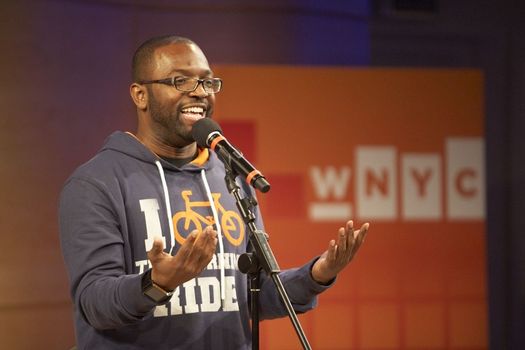
Baratunde Thurston, former digital director of the Onion and author of How to Be Black, has written an op-ed praising the practice of digital detox (image via WNYC).
In 2012 Baratunde Thurston was a model child of the internet age. That year he made 1,518 Facebook posts, snapped 4,845 photos, and tweeted to the tune of 11,541 tweets.
By that time he had authored and promoted a New Times bestseller, How to Be Black, and he was the CEO and co-founder of Cultivated Wit, a creative digital agency. The many thousands of tweets and posts begin to make more sense: his livelihood was inextricably linked to his online connectivity. But one day Thurston decided to give all his inter-connectivity up; no email, no Facebook, no tweets. He would fast from the internet for exactly twenty five days.
But why? Why would “the world’s most connected man” turn his back on the best connector in history–the Internet? Why would the CEO of a digital agency whose success was woven into (and arguably woven out of) the fabric of the World Wide Web flee from modern connectivity so drastically and for so long?
In his insightful op-ed piece for Fast Company Magazine he explains it like this:
“I had begun to resent the emails and the mobile notifications, the many ways that an odd and wide assortment of people dared to enter my life. . . . I realized I wasn’t craving physical escape. I didn’t actually want to be alone. I just wanted to be mentally free of obligations, most of which asserted themselves in some digital fashion.”
Taking a deliberate break from the internet can be a mental refuge from the constant demands of our highly-connected world. View this sign here.
And so at 8 p.m. on Friday, December 14, 2012, three hours behind schedule (going off the grid, it turns out, is complicated), his digital detox commenced. And it would last through Monday, January 7, 2013.
Contrary to expectations, Baratunde Thurston didn’t lose it. He didn’t crack, running through the streets expressing his anguish in loud, tweet-length outbursts of rage.
In fact, he loved his digital detox, and he didn’t want it to end.
Signs of digital overdose
Even before you read his reasons, you may be able to relate. Many of us feel, to some extent, over-saturated and over-shared. We all know that feeling of panic when our phone dies and we feel horrifyingly cut off from the world.
A new acronym, FOMO (Fear of Missing Out), describes the social anxiety caused by seeing events online (via Facebook photos, for example) that happened when you weren’t there. After a while, as happened with Thurston, the pressure can take its toll–we can become irritable, anxious, or high-strung. And in extreme cases, some psychologists even claim that “internet addiction is as real as compulsive gambling, drug abuse and binge eating.”
With the advent of smart phones, many of us carry around digital distractions all of the time. View this sign here.
Many of us don’t have the luxury (or courage) to cut ourselves from The Great Share for 25 days. I for one don’t. The trick here, I think, is baby steps. So I asked around, and drew from my own experience to create a digital detox lite–three not-so-crazy suggestions to help anyone who’s interested in safeguarding their digital sanity. They are as follows:
Digital detox (lite)
1) No texting while driving
Nor while walking, nor at dinner with friends. Nada. In his op-ed, Baratunde quoted his friend Anand Giridharadas’ wonderfully sage advice: try “being thickly in one place, not thinly everywhere.”
2) Consult a person first, and then a computer
If you’re like me, you would rather scroll through fifteen pages of Yelp’s five-star manic-depressives before you ask the humans you share an apartment with where you should eat. This is strange and alienating behavior. It must stop!
3) Record less, describe more
Yeah, your brunch was pretty. We know. But I’d be way more interested in how the flavors worked together, or what that dish reminded you of from your childhood. Heck, if you sketched your brunch and loaded that, I’d be infinitely more impressed, and as an added bonus I would know more about you and your (in)ability to draw.
Because isn’t this why all these networks, in essence, exist–to allow us to know each other and our surroundings better? And if so, why do we allow them, so often, to fail us? Perhaps, before we tweet or post again, we would be wise to reflect on the words of everyone’s favorite wild-haired physicist, a man who had no concept of the internet, but an incredible grasp on humanity, who seemed to have predicted the anxiety of the digital age with this simple reminder:
“Information is not knowledge.”
-Albert Einstein
And with that I leave you to wrestle with your digital sanity.